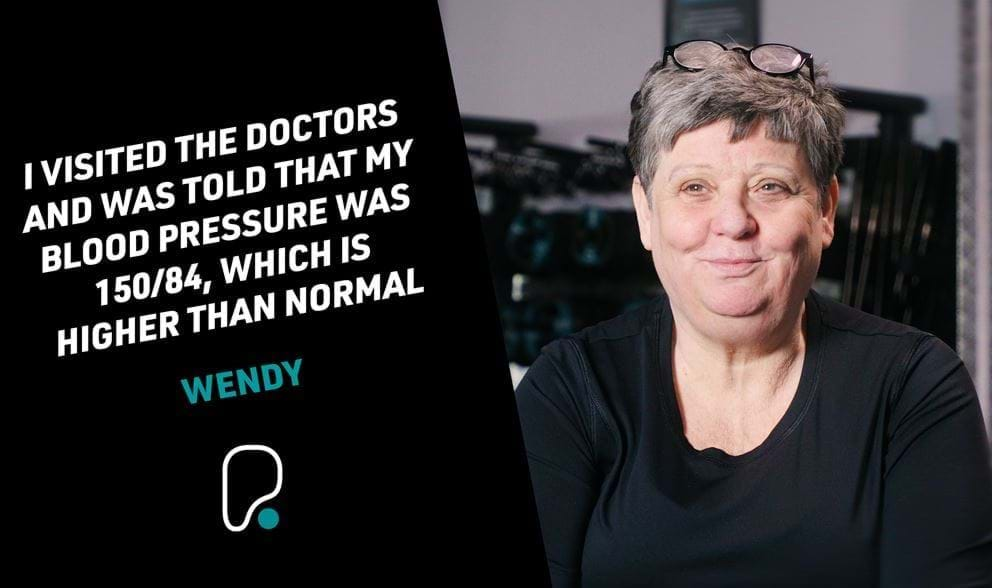How to Look After Your Heart Health
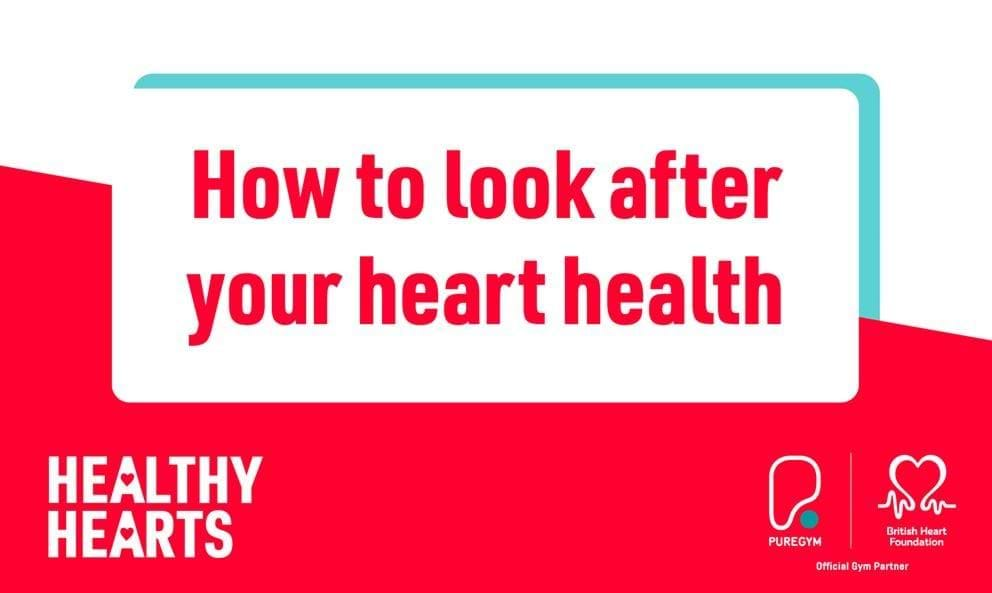
It is World Heart Day on 29th September and we're proud to be the official gym partner for the British Heart Foundation.
To mark World Heart Day, we're sharing lots of helpful tips and easy to digest information about your heart with the help of the experts at the British Heart Foundation.
Stay tuned to learn more about how your heart works, along with simple changes and actions you can do to look after your heart health.
Why should I care about my heart health?
Your heart is arguably the most important muscle in your body. It pumps blood to deliver oxygen and nutrients to your muscles, brain, and organs to keep you alive.
Without us realising, our heart beats around 115,000 times each day, continually pumping approximately 5 litres of blood around your body through a complex network of blood vessels, called your circulatory system.
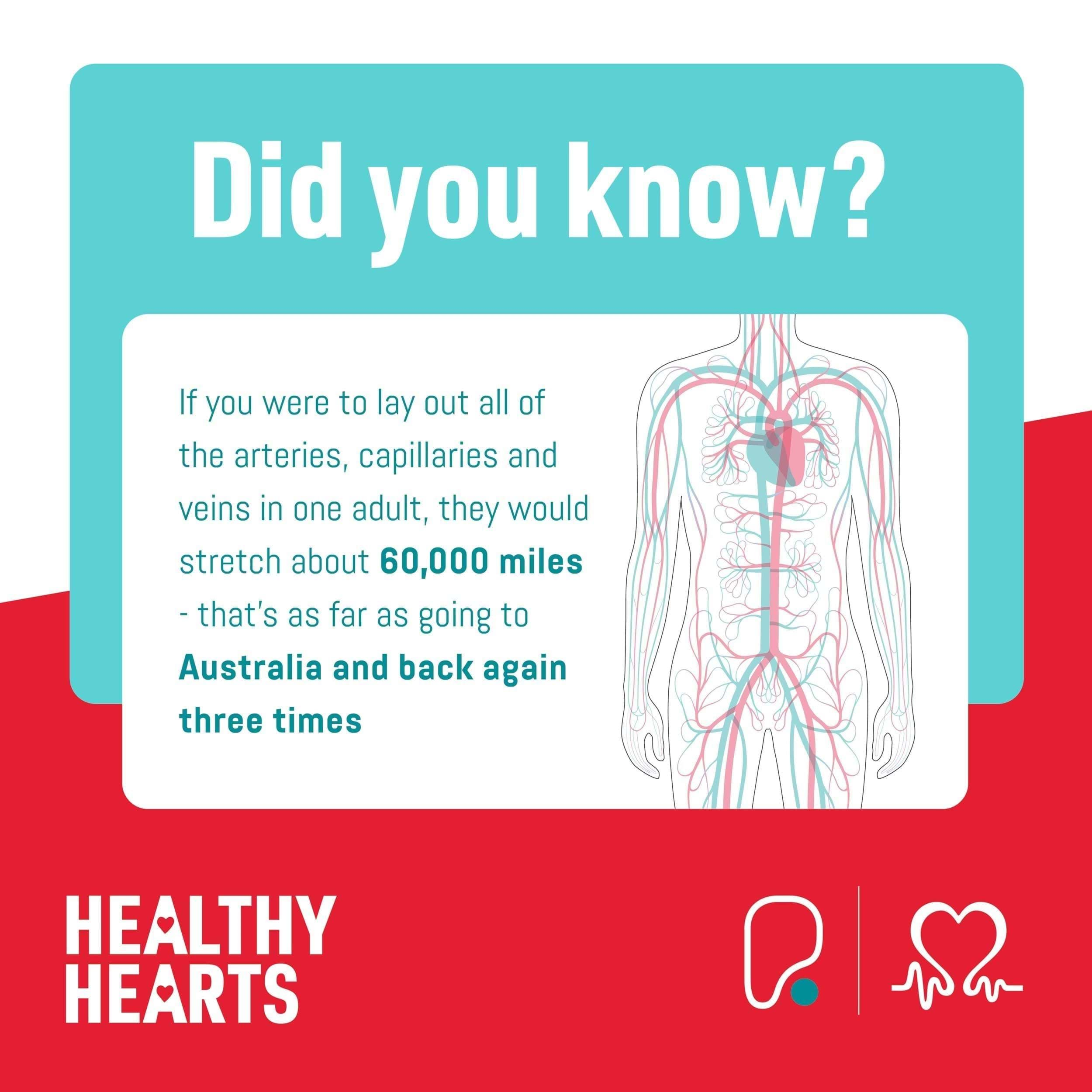
One of the most incredible things about our heart is that it's an involuntary muscle, which means it regulates its contractions (otherwise known as beats) by itself. There is no wonder many of us don't ever think much about our heart -- because it just works.
But that's what we, together with the British Heart Foundation, want to change. We want to get more people thinking about their heart health and making small swaps to lower their risk of heart and circulatory disease.
Just like we go to the gym to train our legs, chest, and arms -- we should also be trying to make our heart healthy too.
We all have a heart, so let's look after it.
What can happen if I don't look after my heart health?
It's estimated that in the UK, more than half of us will get a heart or circulatory condition in our lifetime, many of those being preventable. Which is why it's so important that we all try to look after our heart health, now.
Heart and circulatory diseases can be caused by fatty material building up in our arteries, the vessels that carry blood to our organs. This build-up can damage the arteries and cause them to get narrow or blocked, which is called coronary heart disease.
The good news is that there are simple ways to reduce the risk of this happening such as being more physically active and eating better, which we'll discuss in more detail within this blog.
What puts me at risk of heart and circulatory diseases?
Whilst some people are born with these conditions and others are inherited, for many, the most important way to improve your heart health is to first understand the main risk factors which increase your chance of developing a heart and circulatory disease.
Learning more about these risk factors can help you to identify which things may apply to your lifestyle and what changes you could make to reduce your risk of getting any of these conditions.
The main risk factors for heart and circulatory diseases include:
- High Blood Pressure
- High Cholesterol
- Type 2 Diabetes
High Blood Pressure
Blood pressure is the pressure of blood in your arteries. While your blood pressure can fluctuate throughout the day and night, but, if your overall blood pressure is consistently high, this is called High Blood Pressure.
High Blood Pressure is medically known as hypertension and is categorised as a blood pressure above 140/90mmHg (or 150/90mmHg if you're over 80). A poor diet, not enough physical activity, and lifestyle choices such as drinking too much alcohol or smoking, can all contribute to high blood pressure. Certain medical conditions can also cause high blood pressure.
High blood pressure puts your heart and circulatory system under strain. As a result, your heart must work harder to pump blood around your body, and this can cause damage to your heart and blood vessels.
High Cholesterol
Everybody has cholesterol. It's a fatty substance found in your blood which is produced naturally in our liver and comes from some of the food we eat. We need it to stay healthy because every cell in our body uses it, however, too much of it can be damaging.
There are two main types of cholesterol:
- High-density lipoproteins (HDL) are called 'good' cholesterol.** They help to get rid of the 'bad' cholesterol from your blood. It takes the cholesterol that your body doesn't need back to the liver, which breaks it down so it can be passed out of your body as waste.
- Non-high-density lipoproteins (non-HDL) are called 'bad' cholesterol.** When there is too much non-HDL cholesterol in your blood, it can lead to a build-up of fatty material inside the walls of your blood vessels. This can make it harder for blood to flow through, which increases your risk of having a heart attack or a stroke.
High cholesterol is when your total cholesterol in your blood is high, meaning you could have too much bad (non-HDL) cholesterol in your blood. This can be caused by eating too much saturated fat, not being active enough, having too much body fat (particularly around your middle) or sometimes due to a medical condition such as liver disease or an underactive thyroid.
Type 2 Diabetes
Diabetes is a condition which means our blood glucose level is too high. Although there are different types of diabetes, 90% of people with the condition in the UK have type 2 diabetes. This is when the body can't produce enough insulin (a hormone that allows the glucose in our blood to enter our body's cells and provide us with fuel) or that the insulin it produces isn't effective.
Over time, if your blood glucose levels are too high, this can damage your arteries, increasing your risk of a heart attack or stroke.
There are many factors that can lead to type 2 diabetes, including being physically inactive, eating an unhealthy diet and having excess weight. Having a family history of type 2 diabetes, or pre-diabetes, are also risk factors.
How can I look after my heart?
So, you understand the main risk factors, now what? We understand that looking after your heart health may seem a little daunting at first, and it can be easy to brush aside as it's not something we can physically see or track immediate progress.
However, there are lots of simple, small changes you can start making today to look after your heart health and lower your risk of getting heart and circulatory disease. It doesn't have to be all or nothing -- taking just one step today is a step in the right direction.
Move More
Physical activity has so many benefits for both your physical health and your mental wellbeing and moving more is a simple but effective way to start looking after your heart health.
Being physically active can help to protect your heart by managing your cholesterol levels, blood pressure and weight.
It's recommended that we all aim to do strengthening activities that work all major muscle groups on at least 2 days per week, as well as, 150 minutes of moderate-intensity aerobic activity or 75 minutes of vigorous-intensity aerobic activity per week.
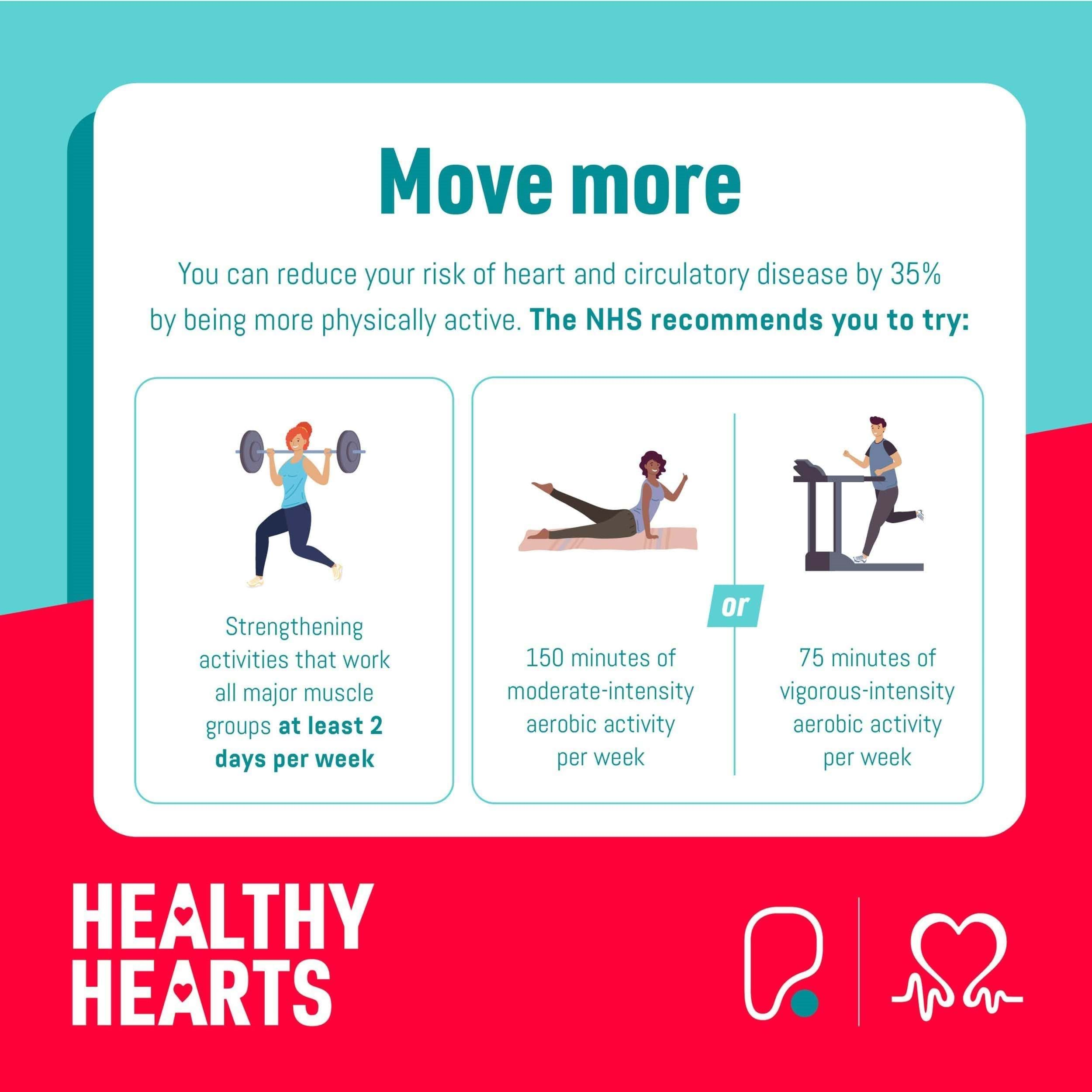
But you don't need to run a marathon right away or go to the gym every day. Moving more for your heart health is all about taking small steps to increase your physical activity levels from where they are right now.
Try to do something that makes you:
- Breathe harder
- Feel warmer
- Increase your heart rate
At first, that might be taking the stairs instead of the lift or getting off the bus a stop earlier and walking the last stretch. But small swaps all add up.
Aiming for more movement day-to-day can make a big difference. Try and find physical activity that you enjoy, as you're more likely to stick to it! That could be aerobics, swimming, cycling or rock climbing or even putting on your favourite album and dancing around the house for 30 minutes. Whatever it is, just try to move more, to look after your heart health.
Eat Better
The food we eat has a big impact on our overall health, as well as our heart health. A healthy, balanced diet can help to reduce your risk of developing coronary heart disease, type 2 diabetes, and high blood pressure, as well as lower your cholesterol levels and manage your weight.
We know that changing a lot about your diet all at once can be overwhelming and unrealistic. So instead, try to focus on small simple swaps and gradually build the habit from there.
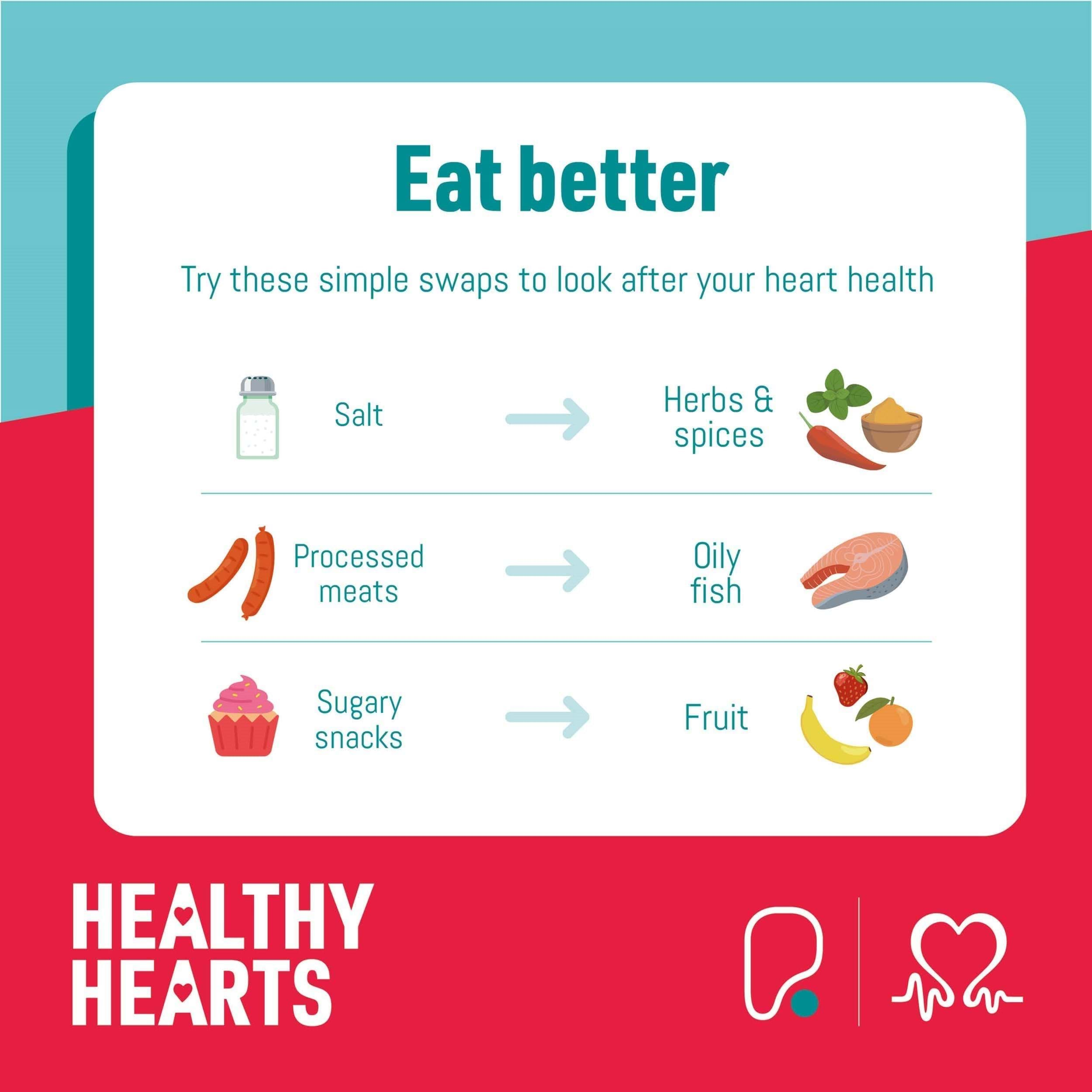
Here are 3 small ways to make a big difference to your heart health:
Eating more fruit and vegetables
Fruit and vegetables are packed full of important vitamins, minerals, and fibre, so are an easy way to add more health to your plate. They can support the normal function of your immune and digestive system and improve your overall health.
Whether they’re fresh, frozen, or tinned, they still pack all the important micronutrients to help your body and heart stay fit and healthy.
Cutting back on saturated fat
Eating too much saturated fat can increase your non-HDL cholesterol within your blood, which is known as the 'bad' cholesterol. Having high cholesterol can increase your risk of heart disease.
Aim to consume no more than 10% of your daily calories -- that's 16 -- 25g of saturated fat per day.
A simple way to do this is to try and cut down on foods high in saturated fats, for example processed meats like sausages and bacon, butter, cheese, pastries, cakes and biscuits.
You might also find it helpful to use a physical or digital food diary that helps you to keep track of how much saturated fat you are eating per day. You can check the saturated fat content in foods by checking the nutrition label, or some digital food diaries let you to scan food barcodes to see the information too.
Reducing your salt intake
Salt adds taste to our food but eating too much can increase the risk of developing high blood pressure, which is one of the main risk factors for heart and circulatory diseases.
This can damage our arteries which play a vital role in carrying blood to our organs.
Adults should eat no more than 6g of salt per day (2.4g sodium) which is only about one teaspoon. While this sounds a lot, many of us likely eat much more than this. That's because processed and pre-packaged foods often have salt already added and some people may add even more without realising.
A simple way to reduce your salt intake is to check the salt content in the everyday foods you buy and try to choose lower-salt options. You can do this by looking at the nutrition label, which often shows salt content as colour-coded: green (low), amber (medium) and red (high). Try to opt for green or amber foods, and only eat high-salt foods in small amounts.
If the nutrition label only shows sodium, you can work out the amount of salt in the product by multiplying the total sodium by 2.5. For example, 1g of sodium per 100g is 2.5g of salt per 100g.
Getting creative with cooking and swapping salt for various herbs and spices can also help you to lower your intake without compromising on flavour.
Manage stress
Stress can affect us in many ways, both physically and emotionally, and it may make us feel worried, anxious, tense and maybe even a little frazzled.
We all feel stressed at times, and although there is no direct link between stress and heart and circulatory disease, prolonged stress can lead to poor quality sleep and lifestyle choices that aren't good for our heart health. Managing stress is no easy feat but it's important to manage the best we can and practice self-care.
A great way to start managing your stress is to take time to reflect on things that may be adding pressure to your life and try to identify any triggers or patterns to your stress. From there, you can then look to make small lifestyle changes to reduce stress, overwhelm and pressure from external sources.
You could also try box breathing whenever you feel particularly overwhelmed with stress. It's an effective deep breathing technique to help reduce stress and anxiety.
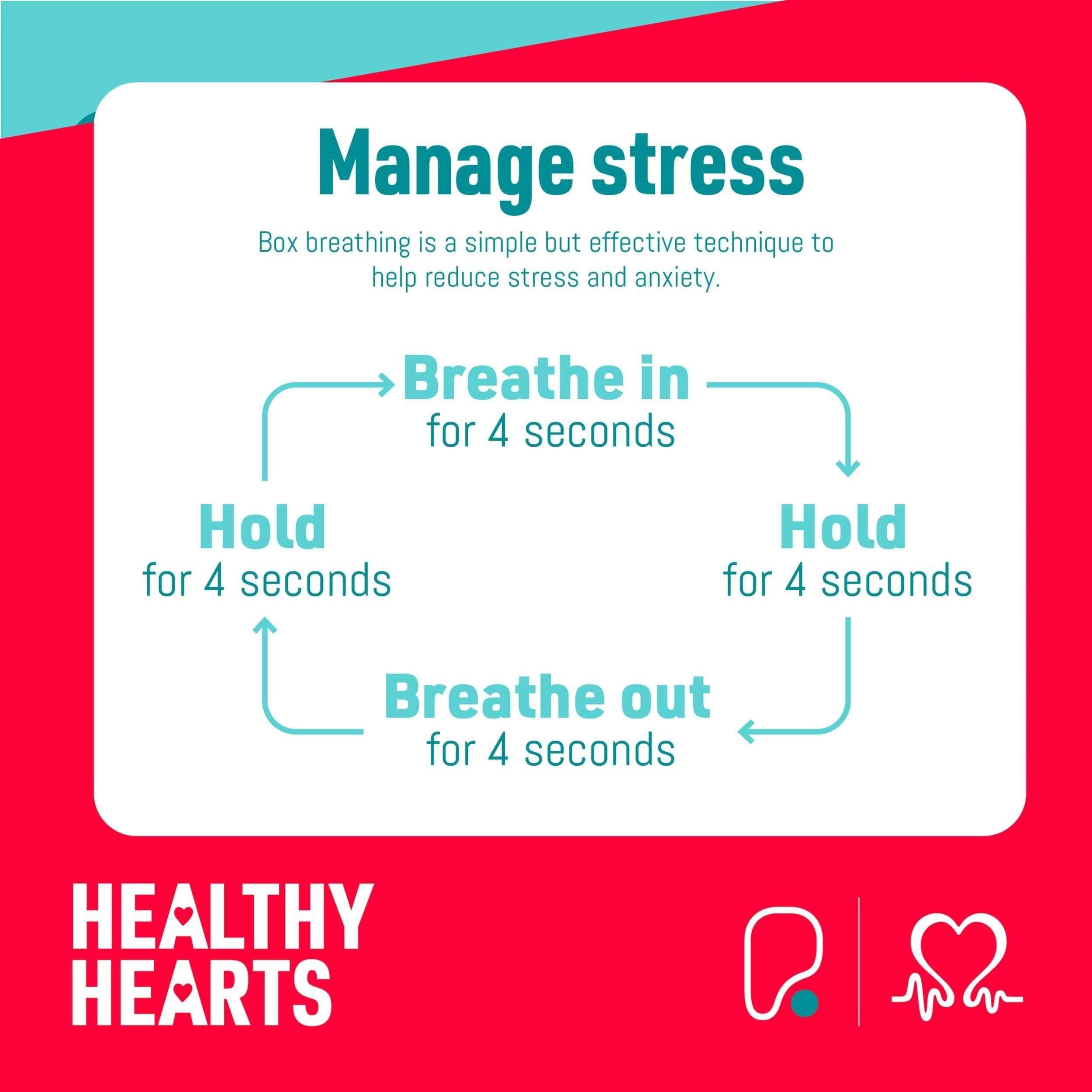
Cut down on alcohol
It's recommended to not drink more than 14 units of alcohol per week, which is approximately the equivalent of 6 pints of 4% beer or 6 glasses (175ml) of 13% wine. However, with alcohol a large part of social culture, many people will find they drink more than this.
Over time, drinking too much alcohol can raise your blood pressure, increase your risk of type 2 diabetes, and add lots of hidden calories to your diet. Keeping within the recommended alcohol guidelines helps to reduce the risk to your health.
Even just cutting down on how much you drink, rather than giving up alcohol completely, is still an important step for protecting your heart health and overall health.
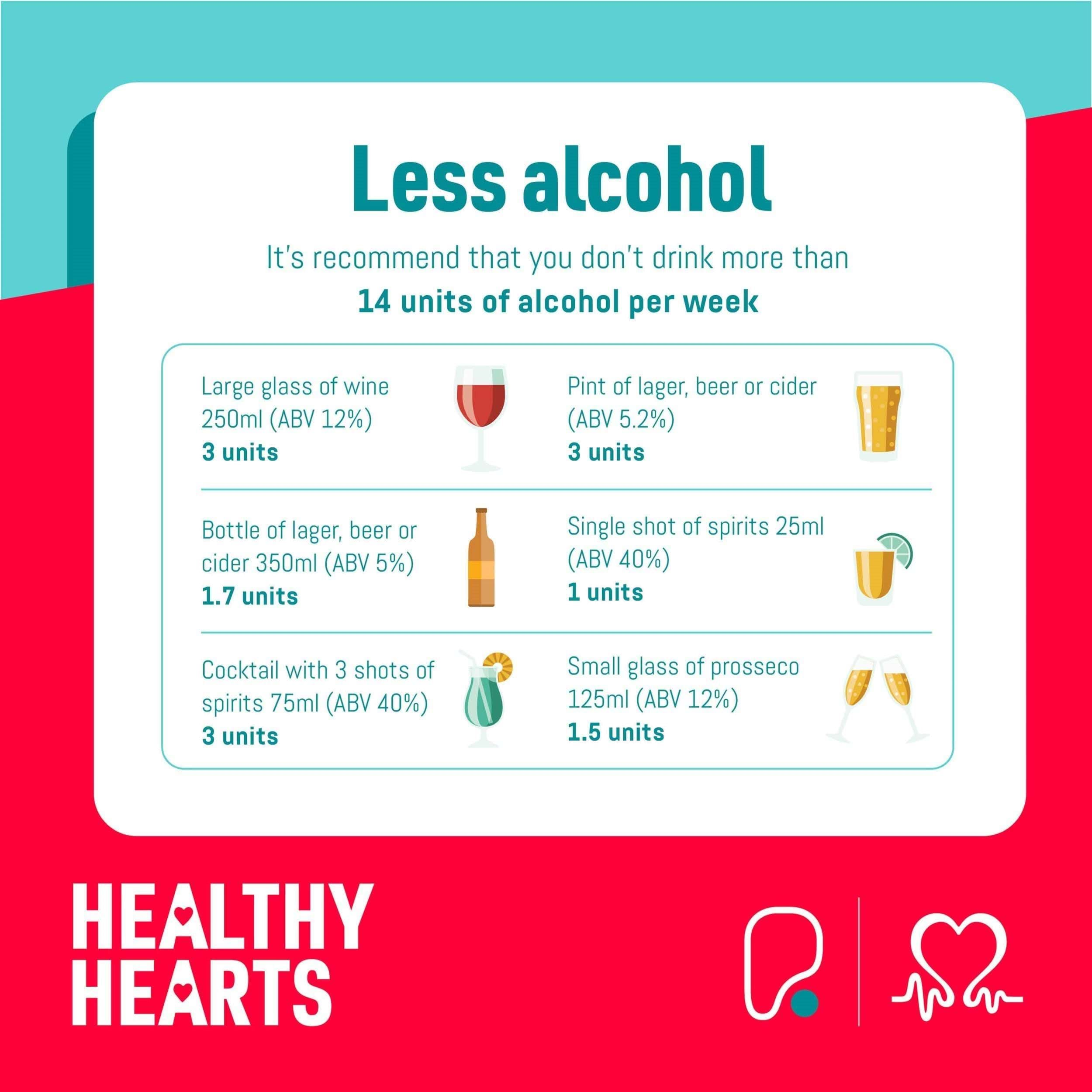
Small changes all add up, so why not try to make some simple swaps to cut back on your alcohol and calorie consumption:
- Chose low-calorie or diet mixers to cut down on extra calories and sugar
- Opt for a smaller measure of alcohol, such as a small glass of wine rather than a large or a bottle of beer rather than a pint
- Opt for a smaller measure of alcohol, such as a small glass of wine rather than a large or a bottle of beer rather than a pint
- Avoid alcoholic drinks containing energy drinks, as they are often packed with sugar and unhealthy additives
- Try alcohol-free or reduced alcohol alternatives to your favourite drinks, but still be mindful of the calories
- Make every other drink a non-alcoholic one to cut down the amount of alcohol you drink
Manage your weight
Although health isn't all about the number on the scales, managing your weight can be a way to look after your heart health.
The British Heart Foundation share that being overweight can lead to high blood pressure, high cholesterol and type 2 diabetes which all increase your risk of heart and circulatory disease.
Therefore, managing your weight, alongside your overall health and wellbeing, is very important for looking after your heart.
If you do feel like you need to lose weight, this should be done through a combination of gradual and healthy lifestyle changes rather than excessive calorie restriction or fad diets. Instead, focus on eating healthier, watching portion sizes, and increasing your physical activity.
Quit smoking
Smoking is very harmful to your heart, so giving up smoking is the best thing you can do for your own health and those around you.
Cigarettes are packed with toxic chemicals, which among many other harmful side effects, can make the walls of your arteries sticky. This makes it easier for fatty material to stick to the walls, reducing space for blood to flow properly. As a result, your arteries can begin to get blocked and damaged, which can lead to a stroke or a heart attack.
Smoking also increases your risk of blood clots, causes an instant rise in your heart rate and blood pressure, and reduces the amount of oxygen delivered to the rest of your body.
Quitting smoking altogether is the best thing you can do, but even cutting back and gradually reducing how much you smoke is a great start.
Want to learn more?
Interested in finding out more about how your heart works? We've got you covered too. Check out our blog on how your heart works and learn the basics about your hearts anatomy and how it keeps you alive.
To find out more about our partnership with the British Heart Foundation and more helpful resources and information, click here.

